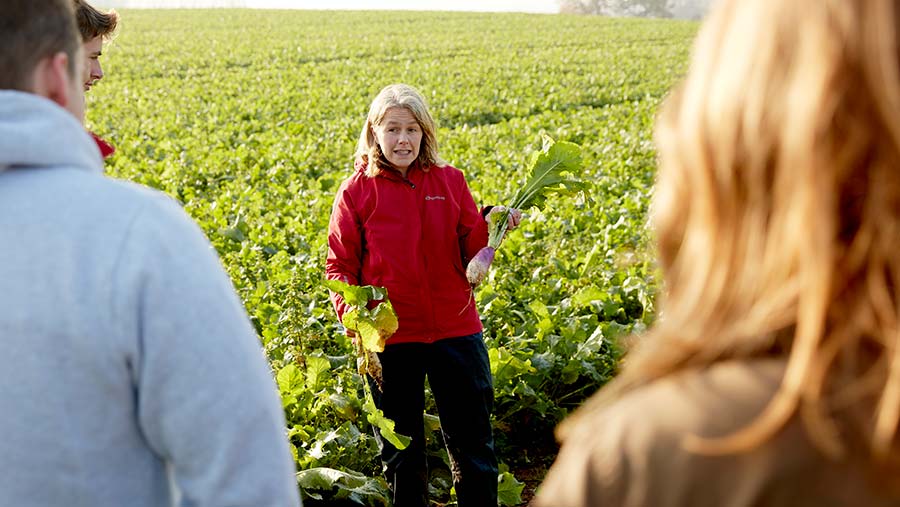What’s new in the world of land-based college courses?
 © Rob Smalley
© Rob Smalley Educational opportunities in the land-based sector are constantly developing, to reflect the changing needs of employers and the rapid growth of technology.
Farmers Weekly highlights some of the newer courses that have emerged in the world of food, farming and countryside management.
See also: All the latest career opportunities and advice
Applied Agriculture
Hartpury College
BSc Honours
Gloucestershire-based Hartpury College has just launched an applied agriculture degree that has specifically been designed to make sure students have the right practical knowledge and skills they need to hit the ground running when they find a job.
Students will be exposed to real-world situations on the college’s commercial farm and can also take advantage of a range of work placements.
They can even spend a term in partner universities in Canada and the US.
Agricultural Technologies
Moulton College
BSc Honours
Moulton College in Northamptonshire is now offering a course designed to reflect the growing role of technology on farm today.
The course, which will be available from September 2018, aims to produce graduates with the necessary skills and knowledge to work in farming, engineering and the wider agricultural sector.
Topics covered will include precision farming, agricultural engineering technology and design as well as advancements in animal science technologies.
Food Business Management and Marketing
Newcastle University
BSc Honours
This degree, offered by the School of Agriculture, Food and Rural Development, aims to give students a thorough academic grounding in the principles underpinning the agri-food sector.
It means graduates should be well-placed for a wide range of management careers in the global food supply chain, working for food retailers, processors and manufacturers.
There is an optional year-long placement that gives students the opportunity to gain first-hand experience of working in the sector and developing their professional experience.
Integrated Agricultural Business Management
Nottingham University (Sutton Bonington campus)
BSc Honours
The aim of this course is to arm graduates with the latest agricultural science, technology and business knowledge so they can slot into employment with a range of agri-businesses, including the food supply chain and retailers.

© View Pictures/ Rex/Shutterstock
A three- or four-year course, depending on whether students do a year in industry as a placement, students are taught the fundamentals of food production, agri-food markets and business management, before moving on to more advanced topics in the management of human and technological resources and business strategy.
Agriculture
University of Hertfordshire
BSC Honours
The title of the course may not be new, but the University of Hertfordshire is planning to offer its first undergraduate agriculture degree in September 2018.
The course is being developed in conjunction with leading employers in the food and farming industry, including Sainsbury’s and BASF.
It will also be delivered in partnership with the Royal Veterinary College, Rothamsted Research and Oaklands College.
Students will study part of their degree at each of these partner institutions, taking advantage of their cutting-edge facilities.
Countryside Management (top-up)
Royal Agricultural University
BSc
The Royal Agricultural University has introduced a portfolio of environment courses, alongside its long-standing agricultural and business management offering, to raise the profile of the environmental component of rural land management.

© Christopher Jones/REX/Shutterstock
The aim is to ensure graduates are equipped to make effective management decisions that will not only deliver traditional outcomes, such as food production, but also environmental outcomes such as clean air and water and improved biodiversity.
Graduates should be well-placed for careers in ecological consultancy and agri- environmental advisory work, as well as working with organisations such as Natural England, the Wildlife Trusts and the Forestry Commission.
Agricultural Sciences and Production Systems
Harper Adams University
PgC/PgD/MSc
This taught postgraduate course is aimed firmly at making sure students have an understanding of global and animal production systems and the need to produce food in an environmentally sensitive manner.

© Rob Smalley
It is designed to produce agricultural specialists who can come up with creative solutions to the challenge of feeding a global population of 9 billion by 2050.
It can either be completed as a one-year full-time course or a two-year part-time one.
Agri-food technology
University of Lincoln
MSc
This is another one-year taught postgraduate course that has been launched as a result of demand from employers in the agri-food industry.
The MSc is intentionally wide-ranging in order to prepare students for a good variety of openings in the sector.
But modules can include commercial and operational management, agri-food robotics, new product and process development as well as advanced crop science.
Exchange programme aims to broaden experience
Writtle University College has partnered with JAMK University in Finland and Fontys International Business School in the Netherlands to give its horticulture students, and soon its agriculture ones, the chance to work on a valuable international project.
Students from each of the three universities will form a working group and spend five weeks with each other at the three different universities.
They will be tasked with developing an agricultural product, based on market and consumer research.
Henry Matthews, agriculture lecturer at Writtle University College, says it is a unique exchange experience that gives students the opportunity to develop an agricultural product from conception to market readiness.
“Career opportunities in the agricultural industry are now varied, including product development and marketing,” he says, “with sustainability and environmental responsibility becoming more and more important.
“By taking advantage of the complementary portfolios of the Dutch and Finnish institutions, this project gives students the opportunity to develop skills in these areas, widening their interest and the choice of careers they can pursue after graduation.”
Getting students ready for the workplace
Harper Adams University has introduced a module, Skills for the Agricultural Professional, into its 2017 agriculture course as part of its mission to produce students who are “work-ready” for their placement year and the workplace when they graduate.
Focus areas include IT, health and safety, report writing, job applications, personal reflection, development planning and professional development.
Over the past year, Harper Adams has also taken steps to open up agricultural courses to people who are not from a farming background, by allowing them to start on an agricultural course without meeting the usual work experience requirements.
The Access to Agriculture initiative gives students who may have struggled to arrange pre-study work experience until the end of their first year to get the required 10 weeks of work experience under their belts.
